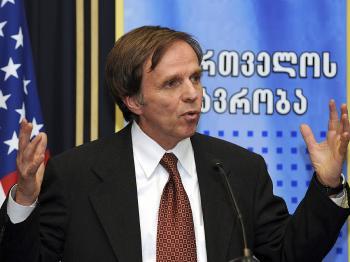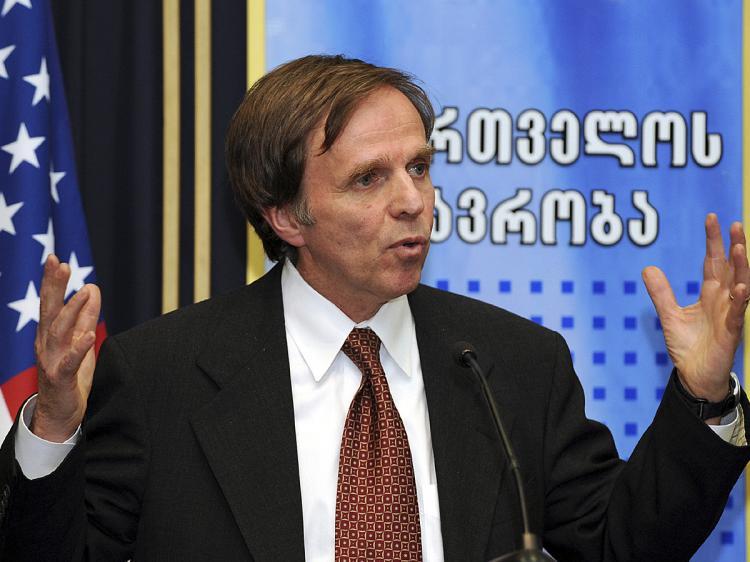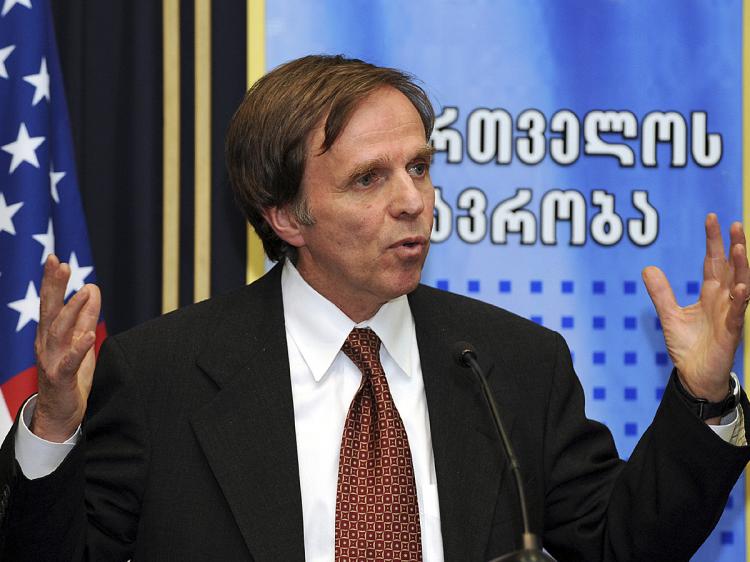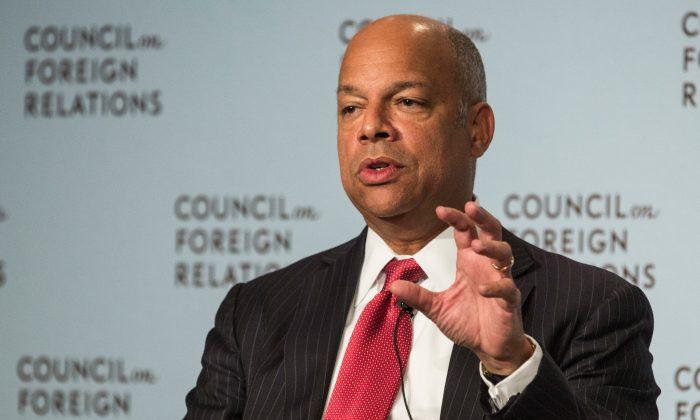No action resulted from two days of U.S.-China human rights dialogue last week. The dialogue between mid-level U.S. and Chinese officials yielded no concrete results.
Assistant secretary of State for Democracy, Human Rights, and Labor Michael Posner, who led the U.S. side, was satisfied that together the U.S. and Chinese delegation “laid a foundation to continue those discussions” in the future. He briefed media on the dialogue May 14 at the State Department.
It seems an odd time to be laying a foundation for future discussion as this is not the beginning of the U.S.-China dialogue on human rights. In the past the United States has successfully lobbied for the release of dissidents and others jailed in China for political or religious views.
The foundation Posner speaks of seems to be for the human rights dialogue to head in a new direction. A relationship where human rights and economic and trade agreements are discussed at different times and different tables.
This human rights dialogue took place as a separate set of talks from the strategic and economic dialogue, which will take place later this month in Beijing. The first strategic and economic dialogue was held in Washington last July and attended by Secretary of State Hillary Clinton and other department secretaries including Treasury Secretary Tim Geithner, Secretary of Labor Hilda Solis, Transportation Secretary Ray LaHood, and Secretary of Energy Steven Chu.
It is worth noting the caliber of the officials involved in these two separate dialogues. On the U.S. side the human rights dialogue was handled by Assistant secretary of State for Democracy, Human Rights, and Labor, Michael Posner, and on the Chinese side it was handled by Foreign Affairs Ministry director general for International Organizations, Chen Xu.
Before China was granted status for permanent normal trade relations, the state of human rights in China was reviewed yearly by Congress. Now the Congressional Executive Commission on China keeps tabs on human rights and political prisoners in China. But in 2000 Congress lost its leverage of using trade relations to pressure China on human rights concerns.
This recent dialogue demonstrates the State Department’s shift in the last few years as well. Posner’s comments show the structure of the relationship with China has changed:
“The tone of the discussions was very much not ‘We’ve got all the answers; we’re telling the Chinese how to behave.’ It was framed in an international context, international standards. We’re both obligated. And let’s talk about things that we’re both dealing with, and try to figure out—can we help each other? And where we have differences, how do we mitigate those differences?”
Speaking with AFP, international advocacy director of Amnesty International USA, T. Kumar, said, “Amnesty International is concerned that this dialogue may not have given the right signal about the serious nature of human rights in China.”
In the past the United States told China how to behave. The United States told China how the ‘responsible stakeholder’ it wants China to become should behave. Now the State Department appears to be treating China as an equal, discussing how “can we help each other” do better on human rights.
At the briefing Posner said the dialogue covered topics of religious freedom, labor rights, freedom of expression, rule of law, racial discrimination, and multilateral cooperation. He said a number of individual specific cases were also discussed, but he declined to disclose which cases were raised with his Chinese counterpart.
“The discussions we had were candid and constructive, including a range of areas where we disagree,” Posner said. But no decisions or results were announced.
“Without any meaningful results, the risk is that China can hide behind the holding of talks and bide time,” said T. Kumar of Amnesty International USA.
Assistant secretary of State for Democracy, Human Rights, and Labor Michael Posner, who led the U.S. side, was satisfied that together the U.S. and Chinese delegation “laid a foundation to continue those discussions” in the future. He briefed media on the dialogue May 14 at the State Department.
It seems an odd time to be laying a foundation for future discussion as this is not the beginning of the U.S.-China dialogue on human rights. In the past the United States has successfully lobbied for the release of dissidents and others jailed in China for political or religious views.
The foundation Posner speaks of seems to be for the human rights dialogue to head in a new direction. A relationship where human rights and economic and trade agreements are discussed at different times and different tables.
This human rights dialogue took place as a separate set of talks from the strategic and economic dialogue, which will take place later this month in Beijing. The first strategic and economic dialogue was held in Washington last July and attended by Secretary of State Hillary Clinton and other department secretaries including Treasury Secretary Tim Geithner, Secretary of Labor Hilda Solis, Transportation Secretary Ray LaHood, and Secretary of Energy Steven Chu.
It is worth noting the caliber of the officials involved in these two separate dialogues. On the U.S. side the human rights dialogue was handled by Assistant secretary of State for Democracy, Human Rights, and Labor, Michael Posner, and on the Chinese side it was handled by Foreign Affairs Ministry director general for International Organizations, Chen Xu.
Before China was granted status for permanent normal trade relations, the state of human rights in China was reviewed yearly by Congress. Now the Congressional Executive Commission on China keeps tabs on human rights and political prisoners in China. But in 2000 Congress lost its leverage of using trade relations to pressure China on human rights concerns.
This recent dialogue demonstrates the State Department’s shift in the last few years as well. Posner’s comments show the structure of the relationship with China has changed:
“The tone of the discussions was very much not ‘We’ve got all the answers; we’re telling the Chinese how to behave.’ It was framed in an international context, international standards. We’re both obligated. And let’s talk about things that we’re both dealing with, and try to figure out—can we help each other? And where we have differences, how do we mitigate those differences?”
Speaking with AFP, international advocacy director of Amnesty International USA, T. Kumar, said, “Amnesty International is concerned that this dialogue may not have given the right signal about the serious nature of human rights in China.”
In the past the United States told China how to behave. The United States told China how the ‘responsible stakeholder’ it wants China to become should behave. Now the State Department appears to be treating China as an equal, discussing how “can we help each other” do better on human rights.
At the briefing Posner said the dialogue covered topics of religious freedom, labor rights, freedom of expression, rule of law, racial discrimination, and multilateral cooperation. He said a number of individual specific cases were also discussed, but he declined to disclose which cases were raised with his Chinese counterpart.
“The discussions we had were candid and constructive, including a range of areas where we disagree,” Posner said. But no decisions or results were announced.
“Without any meaningful results, the risk is that China can hide behind the holding of talks and bide time,” said T. Kumar of Amnesty International USA.





